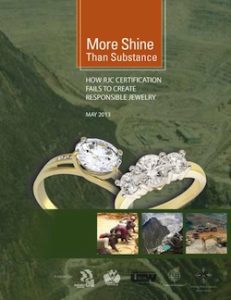Media Contact:
Contacts:
Payal Sampat, Earthworks, 202-247-1180, earthworks.org
Joe Drexler, United Steelworkers, 416-434-7907, usw.ca
Catherine Coumans, MiningWatch Canada, 613-569-3439, miningwatch.ca
Cherisse Fredericks, IndustriALL, +41-22 -308-5023, industriall-union.org
Washington, D.C., Ottawa, Geneva, Sydney, May 22, 2013 – In a new report, More Shine Than Substance: How RJC certification fails to create responsible jewelry, an international coalition of labor and environmental groups indict the Responsible Jewellery Council (RJC)’s certification system as misleading jewelry consumers. The RJC holds its annual meeting in Milan on May 23.
“Jewelry is meant to lift our spirits. But it loses its value if it’s made with gold or diamonds that are tarnished by human rights abuses or environmental destruction,” said Earthworks’ No Dirty Gold campaign director Payal Sampat. She continued, “Unfortunately, RJC’s certification cannot reassure consumers that the gems and precious metals that pass through its system did not come at the cost of community health or clean water.”
The groups releasing More Shine Than Substance include the trade union federation, IndustriALL, which represents 50 million workers globally, CFMEU Australia, United Steelworkers, and environmental advocacy groups Earthworks and MiningWatch Canada.
More Shine Than Substance documents how the RJC’s certification system offers little in the way of real solutions to the serious human rights, labor and environmental problems that caused RJC’s formation. The RJC Board of Directors consists exclusively of industry representatives, with no representatives from impacted communities, labor, or environmental organizations. This exclusion is in sharp contrast to other, more robust, certification systems such as the Forest Stewardship Council.
“RJC can’t polish the image of gold and diamonds while keeping worker and community representatives off the table,” said Jyrki Raina, General Secretary of IndustriALL in Geneva. “Having the industry set its own standards and certify compliance is rather like having the fox guard the henhouse. How can the public have faith in such a process?”
In the wake of campaigns targeting dirty gold and conflict diamonds, and media exposés of the true environmental and social costs of these minerals, jewelry companies recognized that their brands and reputations were at risk. In response a coalition of jewelry trade associations, retailers, and their suppliers, including mining companies, formed the Responsible Jewellery Council.
“If RJC is going to let its member companies claim “responsible business practices” for the corporation as a whole then all their operations should adhere to RJC standards,” said Ken Neumann, National Director of the United Steelworkers in Canada. “Companies like Rio Tinto can’t be RJC-certified as a whole, while remaining a principal investor in mines like Grasberg in Indonesia that don’t meet RJC standards.” The Steelworkers represent workers at several Rio Tinto operations in the U.S. and Canada. In 2012, Rio Tinto locked out 780 Steelworker members in Canada for six months.
The RJC system is riddled with loopholes relating to membership, auditing, and accountability, allowing, for example, member companies as a whole to be certified as RJC compliant even when some of their gold, platinum and diamond-producing facilities — or projects they are invested in — are excluded from RJC audits. The system lacks transparency. Auditors’ reports are not made public, and equally troubling, the RJC itself doesn’t receive evidence or detailed auditors’ reports about operations that it certifies.
Several RJC standards are weak and violate widely accepted social and environmental principles. Under the RJC Code, mining companies can operate in conflict zones, fail to protect workers’ rights to join unions, and allow children as young as 14 to work. It also fails to place limits on water and air pollution and allows toxic waste disposal into lakes and ocean environments.
“Communities living near mines are fighting to protect their health, livelihoods, social and cultural values that are threatened by mining,” said Catherine Coumans of MiningWatch Canada. “Their efforts are undermined by the RJC system that certifies the continuation of the status quo,” she added. “The RJC system does not drive the fundamental change that is needed.”
The report compares RJC’s flaws to that of industry-defined and controlled certification systems in other sectors, such as the Sustainable Forestry Initiative (SFI), which has come under heavy criticism from green groups. In contrast, the Forest Stewardship Council, which embraces multi-stakeholder governance and strong standards, is widely considered a more robust and credible system for certifying sustainable wood products.
“Without significant improvements, the RJC system risks tarnishing, rather than burnishing, the reputations of its member companies,” added Payal Sampat of Earthworks.
###

